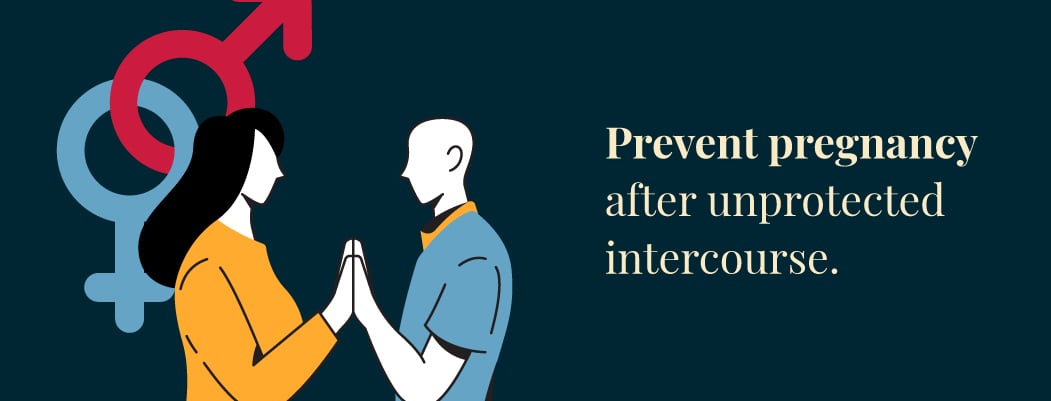How to stop pregnancy after a day of intercourse?
March 21, 2023

How to stop pregnancy after a day?
An unplanned pregnancy can happen to anyone. Despite all the contraceptive options available today, sometimes the methods can fail, or a person may have forgotten to use protection during sexual intercourse. In such a situation, it is essential to know what options are available to prevent an unwanted pregnancy. One option is to use emergency contraception, also known as the morning-after pill, which can be effective in preventing pregnancy if taken within a day of unprotected intercourse.
What is Emergency Contraception?
Emergency contraception is a form of birth control that can be used to prevent pregnancy after unprotected intercourse or contraceptive failure. The most common form of emergency contraception is the morning-after pill, which contains a high dose of synthetic hormones that work to prevent ovulation or fertilisation of the egg.
How effective is emergency contraception?
Emergency contraception is most effective when taken as soon as possible after unprotected intercourse. The morning-after pill can be taken up to 72 hours after intercourse, but it is most effective when taken within 24 hours. Ella, the combined pill, can be taken up to 120 hours (5 days) after intercourse, but it is most effective within the first 24 hours.
According to the American College of Obstetricians and Gynecologists, emergency contraception can reduce the risk of pregnancy by up to 89%. However, it is important to note that emergency contraception is not 100% effective, and it should not be used as a regular form of birth control.
How to obtain emergency contraception?
Emergency contraception is available over the counter at most pharmacies and drug stores. However, depending on your state or country, there may be age restrictions on purchasing emergency contraception without a prescription.
If you are unable to obtain emergency contraception from a pharmacy, you can also speak with your doctor or visit a reproductive health clinic to obtain a prescription or get more information.
Side Effects of Emergency Contraception
Like all medications, emergency contraception can have side effects. The most common side effects include:
- Nausea and vomiting
- Headaches
- Fatigue
- Breast tenderness
- Irregular bleeding or spotting
These side effects are usually mild and go away within a few days. If you experience severe side effects or have concerns about taking emergency contraception, you should speak with your doctor.
Other Options for Pregnancy Prevention
While emergency contraception is an effective option for preventing pregnancy after unprotected intercourse, there are other methods of contraception that can be used to prevent pregnancy before it happens. Some of these methods include:
- Birth control pills: A daily pill that contains synthetic hormones to prevent ovulation.
- Condoms: A barrier method of contraception that prevents sperm from reaching the egg.
- Intrauterine devices (IUDs): A small, T-shaped device that is inserted into the uterus and can provide long-term contraception.
- Implants: A small rod that is inserted into the arm and releases hormones to prevent ovulation.
It is important to speak with your doctor to determine which method of contraception is right for you based on your medical history, lifestyle, and personal preferences.
Barrier methods of contraception are forms of birth control that physically prevent sperm from reaching the egg. They include methods like male condoms, female condoms, cervical caps, and diaphragms. Let’s take a closer look at these methods and how they work:
- Male Condoms: A male condom is a sheath made of latex or polyurethane that is worn over the penis during sexual intercourse. It works by physically blocking sperm from entering the vagina. Male condoms are also effective at preventing the spread of sexually transmitted infections (STIs).
- Female Condoms: A female condom is a pouch made of polyurethane that is inserted into the vagina before sexual intercourse. It works by physically blocking sperm from entering the cervix. Like male condoms, female condoms are also effective at preventing the spread of STIs.
- Cervical Cap: A cervical cap is a small silicone or rubber cup that is inserted into the vagina and placed over the cervix before sexual intercourse. It works by physically blocking sperm from entering the uterus. Cervical caps must be fitted by a doctor and used with spermicide to be effective.
- Contraceptive Pills: Contraceptive pills are hormonal medications that are taken daily to prevent ovulation. There are two types of contraceptive pills: combination pills that contain both estrogen and progestin and progestin-only pills. These pills are highly effective when used correctly, but they do not protect against STIs.
- IUDs: An intrauterine device (IUD) is a small, T-shaped device that is inserted into the uterus by a doctor. IUDs can be either hormonal or non-hormonal, and they work by preventing fertilisation or implantation of the egg. They are highly effective and can provide long-term contraception.
When to Take a Pregnancy Test
If you have had unprotected intercourse or suspect that your contraceptive method may have failed, you may be wondering when to take a pregnancy test. The timing of a pregnancy test depends on several factors, including the type of test you are using and when you ovulated.
Home pregnancy tests work by detecting the presence of the hormone human chorionic gonadotropin (hCG) in your urine. The placenta produces HCG after a fertilised egg implants in the uterus. Most home pregnancy tests claim to be accurate from the day of your missed period, but some tests may be able to detect hCG earlier.
If you have irregular periods or are unsure when your next period is due, it may be difficult to determine when to take a pregnancy test. In this case, it is best to wait at least two weeks after having unprotected intercourse before taking a test.
If you have taken a pregnancy test and the result is positive, it is important to speak with a doctor as soon as possible to discuss your options and receive appropriate care. If the test result is negative but you are still experiencing symptoms of pregnancy, it is a good idea to follow up with your doctor to rule out other possible causes.
When to see a doctor
Call your primary care doctor or obstetrician and gynaecologist and make an appointment.
Summary
In conclusion, barrier methods of contraception and hormonal methods like contraceptive pills and IUDs can be highly effective at preventing pregnancy when used correctly. However, no method of contraception is 100% effective, and it is important to have a backup plan in case of failure. If you suspect that you may be pregnant, it is important to take a pregnancy test and speak with a doctor to receive appropriate care and support.
People also ask
What should be eaten to avoid pregnancy?
There is no specific food that can prevent pregnancy. The only way to prevent pregnancy is to use reliable methods of contraception, such as condoms, birth control pills, intrauterine devices (IUDs), or other forms of contraception prescribed by a doctor.
How can I prevent pregnancy after 12 hours?
Emergency contraception, also known as the morning-after pill, can be taken up to 72 hours after unprotected sex, but it is most effective when taken within 12 hours. You can obtain emergency contraception from a doctor or pharmacy. However, following the instructions carefully to ensure maximum effectiveness is important.
Can salt and water prevent pregnancy?
The use of salt and water as an emergency contraception method, which some groups commonly advocate, has not been supported by any scientific study as an effective means of preventing pregnancy. Therefore, it is essential to use reliable and safe methods of contraception, such as condoms, birth control pills, or emergency contraception prescribed by a doctor, to prevent unplanned pregnancies.








